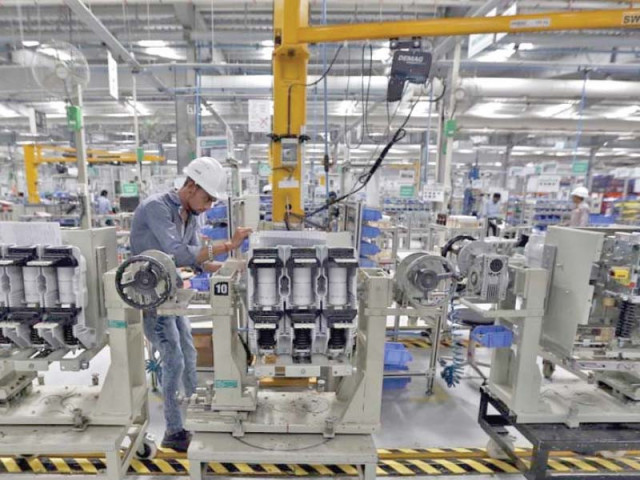IMF must lower industrial tariffs
Without such measures, years of economic contraction can breed frustration

For many pundits, things seem to be falling into place. Following elections, we now have a coalition government with clearly delineated territories. The focus has shifted back to the economy as Pakistan struggles with a sluggish GDP growth rate of 2-3% per year. However, this pace is insufficient, necessitating a doubling of efforts and taking some strategic gambles. Yes, gambles that may or may not pay off but are undoubtedly worth a shot.
One such gamble was the caretaker energy minister’s plan to reduce industrial tariffs by eliminating the cross-subsidy element, alongside expecting substantial dividends from oil and gas exploration companies to reduce the notional circular debt. Reportedly, the International Monetary Fund (IMF) opposed the proposal, citing concerns about shifting the burden back to lower-income residential customers. This situation is both paradoxical and comedic simultaneously.
The IMF doesn’t shy away from encouraging currency depreciation, which leads to inflation and erodes purchasing power, as wages and other economic indicators don’t adjust quickly enough. Nor does it hesitate to push the government to raise the Petroleum Development Levy (PDL) on fuel prices from Rs60 to Rs100 per litre. Additionally, the impact of a 22% interest rate on the exchequer and business community cannot be overlooked. Nevertheless, the government must make a more compelling case to the lender.
Firstly, such measures would curb inefficient consumption. By reducing the cross-subsidy on the residential sector, there would be less wastage of precious gas, particularly among the poorer masses who tend to use it excessively for heating, cooking, and other purposes. The increased financial burden on consumers can be offset by either reducing the PDL by a lesser amount or by providing increased direct subsidies through the Benazir Income Support Programme (BISP). I recommend the former, as only a fraction of the lower and middle classes are registered with the BISP programme, which also fails to adequately address urban areas. The saved gas, until the construction of LNG terminals and major pipelines, could be redirected to the export sector exclusively.
Read Ministries assigned tasks to achieve IMF targets
Secondly, industries will create jobs. Achieving a fairer cost of energy would render manufacturing units more competitive regionally and globally, despite grappling with high interest rates, power outages, a challenging law and order situation, import restrictions, and the withdrawal of cheap financing by the State Bank of Pakistan (SBP). Industrialisation remains the most viable means of absorbing the massive influx of semi-skilled and unskilled youth into the workforce, who in turn would inject their wages back into society, thereby enhancing social equilibrium.
Thirdly, industries will contribute taxes and bolster USD reserves. Currently burdened with a low tax-to-GDP ratio and heavily reliant on imports, the manufacturing sector plays a pivotal role in shouldering a significant portion of the tax burden, often at higher rates than its regional counterparts. While neighbouring countries offer tax incentives, we continue to squeeze the already squeezed. With a level playing field, industrial units—both for exports and import substitution—will begin to chip away at the trade deficit, external debt, and the risk of credit defaults.
Fourthly, reducing circular debt. Existing power projects are already underutilised, while new ones, including hydropower, Thar coal, and renewables, are being planned to shift towards a cheaper variable cost of fuel. However, the existing base is burdened with high capacity charges, which are not the primary component of the electricity bill and are likely to increase further. To increase utilisation, lower per-unit costs, encourage the efficient use of plants, reduce idle wastage, and attract contributions from cash-paying industrial customers, tackling circular debt in this manner is essential.
Lastly, reducing inflation and improving socio-economic development. With local industries benefiting from cheaper gas and electricity prices, they can adequately meet domestic demand, reducing price shocks caused by shortages filled by higher-margin imports. Moreover, economies of scale lead to efficiencies, creating a win-win situation for both business owners and employees who work in a productive job market and thus enjoy better lifestyles. Without such measures, years of economic contraction can breed discord, chaos, and frustration among the lower-middle class.
Therefore, it’s crucial to press the IMF for this plan—although borrowers can’t be choosers—but assurances must be given that reforms will persist. Lenders would prefer to witness revenue-draining entities like Hyderabad Electric Supply Company, Sukkur Electric Supply Company, Quetta Electric Supply Company, Peshawar Electric Supply Company, and Steel Mills permanently handed over to the private sector, rather than haggling over a no-subsidy plan for the industrial revival. The plan already had the blessings of the Special Investment Facilitation Council (SIFC); perhaps SIFC members will need to assure the IMF that reforms will indeed continue. For the sake of 250 million people to gain employment, the industrial wheel needs to move, and move faster.
THE WRITER IS AN INDEPENDENT ECONOMIC ANALYST
Published in The Express Tribune, April 8th, 2024.
Like Business on Facebook, follow @TribuneBiz on Twitter to stay informed and join in the conversation.



















COMMENTS
Comments are moderated and generally will be posted if they are on-topic and not abusive.
For more information, please see our Comments FAQ